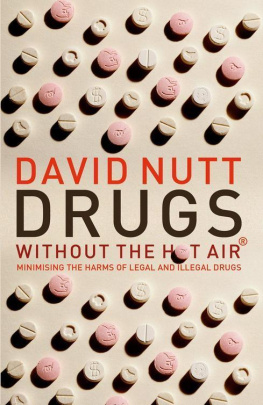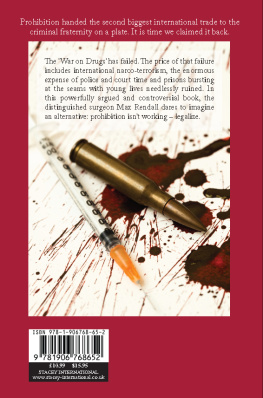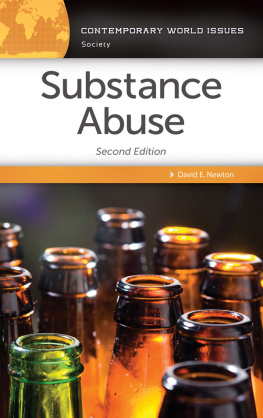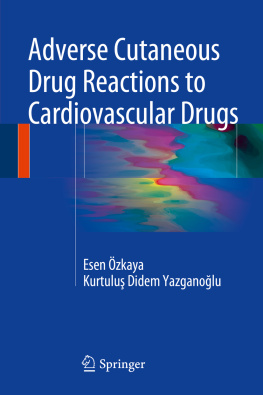The Khat Controversy
The Khat Controversy
Stimulating the Debate on Drugs
DavidAnderson,SusanBeckerleg,DegolHailuandAxelKlein
First published 2007 by Berg Publishers
Published 2020 by Routledge
2 Park Square, Milton Park, Abingdon, Oxon OX14 4RN
605 Third Avenue, New York, NY 10017
Routledge is an imprint of the Taylor & Francis Group, an informa business
Copyright David Anderson, Susan Beckerleg, Degol Hailu and Axel Kleian 2007
All rights reserved. No part of this book may be reprinted or reproduced or utilised in any form or by any electronic, mechanical, or other means, now known or hereafter invented, including photocopying and recording, or in any information storage or retrieval system, without permission in writing from the publishers.
Notice:
Product or corporate names may be trademarks or registered trademarks, and are used only for identification and explanation without intent to infringe.
The khat controversy: stimulating the debate on drugs / David Anderson
... [et al.].
p. cm. (Cultures of consumption series; ISSN 1744-587
Includes bibliographical references and index.
ISBN-13: 978-1-84520-250-7 (cloth)
ISBN-10: 1-84520-250-3 (cloth)
ISBN-13: 978-1-84520-251-4 (pbk.)
ISBN-10: 1-84520-251-1 (pbk.)
1. Qat. 2. Drug traffic. 3. Drug control. I Anderson, David,
1957
HV5822.Q3K53 2007
362.29'9dc22
2007008137
British Library Cataloguing-in-Publication Data
A catalogue record for this book is available from the British Library.
ISBN13: 978-1-8452-0250-7 (hbk)
ISBN13: 978-1-8452-0251-4 (Pbk)
Typeset by JS Typesetting, Porthcawl, Mid Glamorgan
This book has benefited from insights, comments, and assistance provided by a number of people. Degol Hailu says thank you to the following people. In Ethiopia Samuel Assefas support has been instrumental in facilitating access to the various institutions visited during the fieldwork. Amin Abdella gave his time unreservedly and made invaluable contributions to data collection and analysis. Thank you goes to Demeska Tamiru who from the outset showed his eagerness to identify data and literature. Mesfin Hailus patience and support during the arduous travels across Ethiopia were unparalleled. In Djibouti, without the insights and hard work by Ahmed Araita, our research there would not have been possible. Hassan Chehem supplied interesting stories and anecdotes. Neil Carriers careful reading of the literature in French was great help. Most of all, the book greatly benefited from various individuals, government officials, farmers, traders, retailers, exporters and community leaders who gave their time to answer questions and satisfy the authors curiosity.
Susan Beckerleg would like to thank all the people, named and unnamed, interviewed during fieldwork in Kenya, Uganda and Rwanda. In particular, Mahmoud Abdulkadr, Salim Brek, Umaru Sendi, Mahmoud Abdi Jamaa and Salima Said are thanked for their generous time and trouble. A number of local researchers assisted in data collection and deserve thanks and acknowledgement. In Kenya Ali Swaleh assisted throughout the fieldwork period and the first Uganda visit. In Uganda Abu Famau, Musa Almasi and Mzee Hasan were of great assistance. Nuur Sheekh in Kenya and Saidi Famau in Uganda carried out interviews and wrote reports, the findings of which are incorporated into this book. Data from the Uganda consumers survey was entered onto a database by Jason Dowling. Colette Jones is thanked for helping with the technical analysis of our survey data. Swaleh Jumbe, who drove the team in North East Uganda, is thanked for his exemplary work. Finally, Abdul Rahman of Mandera is thanked for allowing us to travel in his convoy from Wajir, for entertaining us to lunch and dinner and for helping us to gain access to the Mandera airstrip.
The final section of the book could not have been written without the support of friends and colleagues from the UK Somali community. Axel Klein would like to thank Muna Deria, Warsan Fowzi, Ahmed Sheik, Saeed Abdi, Sado Omar, Nasir Warfa, Mohamud Ege, Abdul Araru, Hassan Isse, Mahdi Ali and Yakoub Aden Abdi. Further thanks to Akalu and Ralph Beckford for their openness; to Janice Zima and Nadia Lovell for their hospitality; and to the Streatham neighbourhood office for their dedication.
The Khat Controversy
Khat is the most recent plant-based psychoactive substance to spread across global markets. It has traditionally been consumed in East Africa and the Middle East, where it is also known as the flower of paradise, qat (transliterated from Arabic), miraa (its Kenyan name), chat (Ethiopian) and numerous other names which locals use to differentiate various varieties. The actual plant is an evergreen shrub of the Celastraceae, which grows best at an altitude of 5,0008,000 feet (approx. 1,500 2,500 metres). Wild khat trees can grow as high as 80 feet in an equatorial climate, but the farmed variety is kept at around 20 feet with constant pruning (Kennedy 1987; Goldsmith 1994; Lemessa 2001).
Wild plants have been found from Afghanistan to South Africa, but the cultivation of khat has for centuries been confined to a narrow geographical belt ranging from Yemen in the Arabian peninsula to the Meru highlands of Kenya. Over the last twenty years khat has become a global commodity, openly on sale in London and Amsterdam, and covertly in Toronto, Chicago and Sydney. Though global availability of this delicate product would be unthinkable without dramatic advances in transport technology, the key behind this commercial development has been the growth of sizeable markets in Djibouti, Somalia and major urban centres in Ethiopia, as well as across Europe and North America. It is safe to say that the unfolding problematic surrounding the use of khat in Western countries has corresponded to the arrival of large numbers of Somali and Ethiopian refugees from the web of conflict that has been haunting the Horn of Africa for the past thirty years.
Host countries in the West have responded in different fashions to this new phenomenon, with tolerance in the UK and the Netherlands but prohibition in Scandinavia and North America. Across these borders a consensus has formed over the likelihood of transmission. Khat, it is generally assumed, will not catch on among mainstream consumers. Not only are these already generously supplied with a range of mind-altering substances, but also Western consumers are unlikely to take to the involved and unfashionable mode of administration the khat chew. Yet, this European indifference should not lead us to ignore the sharp rise in incidence of khat use in other parts of the world. The data from eastern Africa show how the border of khat use is shifting in all directions. It seems to fit ideally into the consumption trends and patterns of sociability of African towns, and provides a cost-effective alternative to alcohol. The spread of khat production and use has therefore become an issue of global concern.














